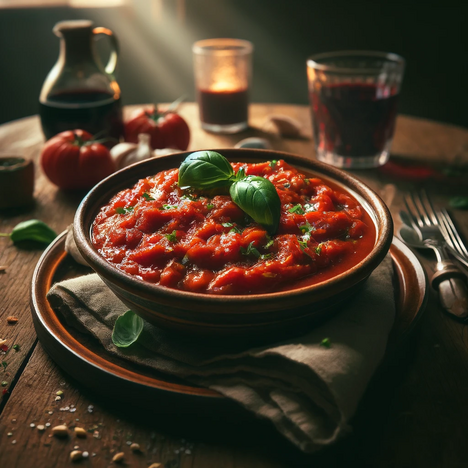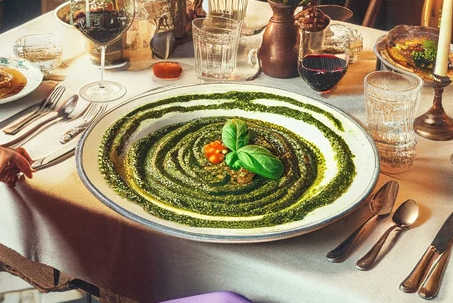Marinara

In the world of human culinary delights, marinara sauce stands as one of the most versatile and popular options. From pasta and pizza to dips and side dishes, marinara is an integral part of many dishes. But what about the compatibility and benefits of this popular sauce when it comes to feeding our four-legged friends? Can a spoonful of this tomato-based delicacy sweeten their day too, or does it carry risks that dog owners should be aware of? Let's delve into the world of marinara sauce and its suitability for dogs.
What is marinara?
Marinara is a simple but aromatic sauce that has its origins in Italian cuisine. It typically consists of tomatoes, garlic, onions and a selection of herbs such as oregano and basil. Marinara sauce owes its popularity to its fresh and uncomplicated composition and its ability to enhance a variety of dishes.
Possible benefits of marinara for dogs
Antioxidants in tomatoes
Tomatoes, the main ingredient in marinara sauce, are rich in antioxidants, including lycopene, which may have various health benefits. Antioxidants help fight free radicals and can therefore help prevent disease.
Vitamins and minerals
Tomatoes provide a source of vitamin C, potassium and other nutrients that can contribute to a dog's overall health. However, it should be noted that dogs usually get their necessary vitamins and minerals from their complete dog food.
Risks and considerations
Spices and onions
Marinara sauce often contains ingredients that can be harmful to dogs, such as onions and garlic. These can be toxic in large quantities and can lead to gastrointestinal distress, anemia or other serious health problems.
High salt and sugar content
Most commercially available marinara sauces contain high amounts of salt and sugar, which is not recommended for dogs. High salt consumption can lead to dehydration and electrolyte imbalance, while too much sugar can contribute to weight gain and diabetes.
Acidity
Tomatoes are naturally acidic, which can cause stomach irritation in some dogs. Particularly sensitive dogs could react with indigestion after eating marinara sauce.
To be enjoyed with caution
While marinara sauce plays a valued role in the human diet, it should be consumed with caution by dogs. The potential benefits of the nutrients contained in tomatoes are clearly overshadowed by the risks posed by ingredients that are harmful to dogs, such as onions, garlic and the high salt and sugar content. If you want to give your dog a culinary experience, there are safer and healthier ways to do so than feeding him marinara sauce. When in doubt, it's always advisable to play it safe with your dog's diet and opt for treats and supplements designed specifically for dogs. This will ensure that your four-legged friend stays healthy and happy without taking unnecessary risks.
If you notice any signs of hypersensitivity or poisoning in your dog, you should see your vet immediately. We are not a substitute for a vet, but we try to be as accurate as possible. Every dog reacts differently and we recommend you get a second opinion or consult your vet if in doubt.
Stay healthy and take good care of your four-legged friend!😊
Similar to Marinara
Tomato sauce is a culinary product consisting mainly of tomatoes, water and various spices and herbs. It can be cooked or raw and is often used as a base for many dishes. While tomato sauce in its...
Arrabbiata means "angry" or "furious" and refers to a tomato sauce that is seasoned with chili, garlic, onions and herbs. The spiciness is intended to reflect the passion of the cook. Arrabbiata is...
Bolognese is a typical sauce from the Emilia-Romagna region in northern Italy. It is usually served with pasta such as spaghetti or tagliatelle and sprinkled with Parmesan cheese. The ingredients of...
Pesto alla Genovese comes from the Liguria region in north-western Italy. The name translates as "pesto from Genoa", the capital of Liguria. The word "pesto" comes from the Italian verb "pestare",...



